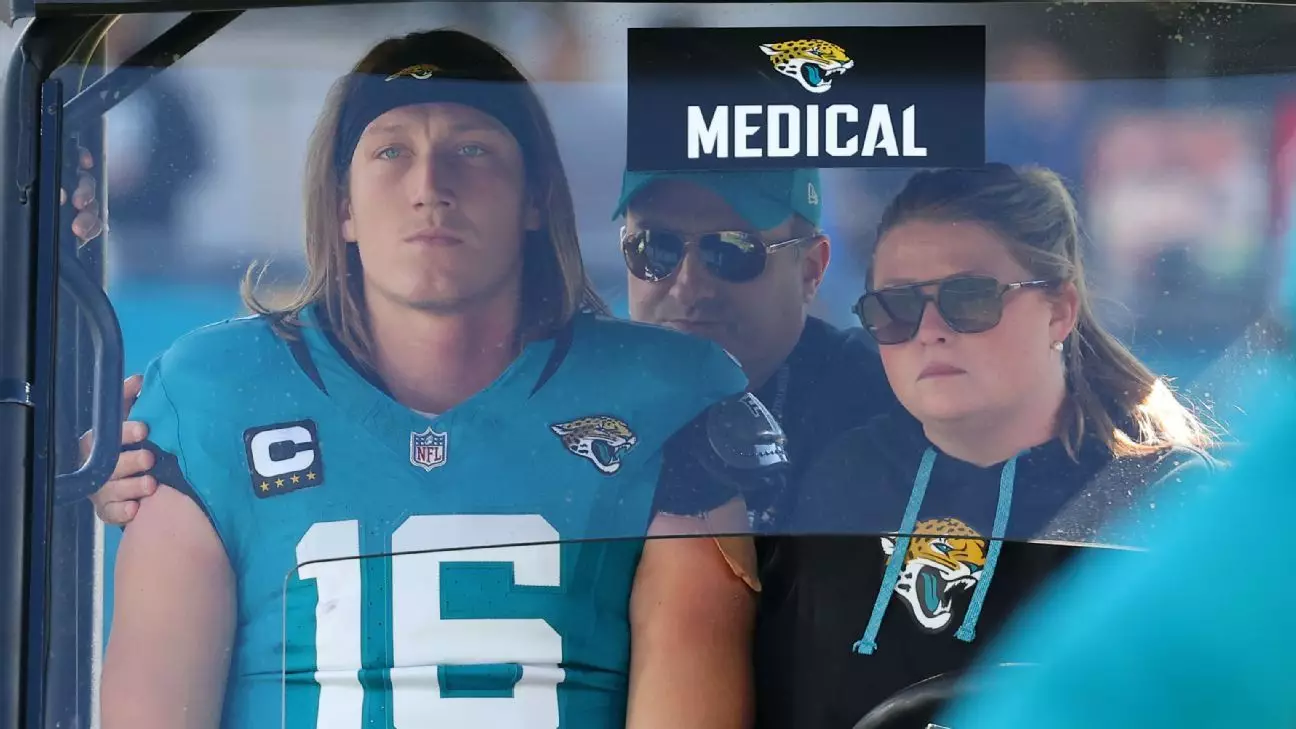In the world of professional football, the fine line between triumph and tragedy often hinges on the resilience and health of key players. For the Jacksonville Jaguars, the fallout from injuries to their star quarterback Trevor Lawrence has not just derailed their season but has also raised significant questions regarding the franchise’s future. Lawrence’s recent placement on injured reserve means he is unlikely to return, marking a disheartening conclusion to a season riddled with physical setbacks.
The latest injury report on Lawrence highlights a concerning trend – injuries are accumulating at an alarming rate. After suffering a sprained AC joint in his non-throwing shoulder, he further complicated his situation with a concussion sustained during a game against the Houston Texans. The severity of these injuries cannot be understated, as they represent not only physical challenges but also mental hurdles that Lawrence must overcome to regain his form. Azeez Al-Shaair’s hit on Lawrence, which resulted in a three-game suspension for the Texans linebacker, is emblematic of the risk quarterbacks face every time they step onto the field. However, the real question lies in the long-term ramifications of such injuries, particularly for a young quarterback with a bright future ahead.
Lawrence’s plight brings to light the broader issue of injury trends in professional football. The statistics surrounding injuries are staggering; quarterbacks, among other positions, have faced escalating injury rates over recent seasons. Lawrence’s case reinforces the notion that consistent injuries can alter the trajectory of a player’s career. As of the current season, Lawrence has dealt with multiple concussions, shoulder injuries, a knee issue, and an ankle setback, which raises questions about his durability and the overall medical practices of NFL teams.
Furthermore, throughout history, teams that rely heavily on a single star player often face steep challenges when that player is sidelined. The dilemmas faced by the Jaguars serve as a case study in the importance of having a deep roster. Mac Jones, who stepped in for Lawrence and succeeded in throwing two touchdowns during a late-game rally, becomes the focal point for the Jaguars’ offense moving forward. Yet, there’s a concern; the team managed only 13 combined points in losses during Lawrence’s absence due to a previous shoulder injury.
The immediate fallout from Lawrence’s injuries reverberates throughout the Jaguars’ organization. The decision to place him on injured reserve is a clear acknowledgment that the team’s aspirations for this season have all but dissipated. With the Jaguars languishing at 2-10, the leadership within the organization must assess the long-term outlook. Lawrence’s five-year contract extension, worth $265 million, tied to performance goals, puts additional pressure on both the player and the franchise.
In light of this season’s events, the Jaguars have acted quickly to bolster their roster. The signing of veteran wide receiver Josh Reynolds indicates a proactive approach to mitigate the impact of injuries to key players such as Christian Kirk and Gabe Davis. However, reinforcements alone may not suffice. The chemistry that takes time to establish on the field cannot be rushed, particularly when everything is put into play with a changing lineup.
While facing recovery from injury, Lawrence’s immediate focus may also shift to addressing his long-term health. Speculation regarding potential corrective surgery on his shoulder highlights the intricate balance athletes must maintain between the short-term lifestyle of an active player and their long-term health. Navigating this crossroads will be vital for Lawrence as he seeks to rebound from the current challenges and excel in subsequent seasons.
The Jaguars are entering an offseason filled with uncertainty, but clarity regarding Lawrence’s health will play a significant role in determining their strategy moving forward. The organization must not only consider the ramifications of Lawrence’s injuries, but they must also invest in improving their injury prevention protocols to avoid similar scenarios in the future.
The tumultuous season for Trevor Lawrence serves as a reminder of the inherent unpredictability of professional football. As the Jaguars adapt to life without their star quarterback, they must remain vigilant in their efforts to heal and rebuild for the future. The long-term implications of this season will likely extend well beyond the final game, influencing decisions around player health, coaching strategies, and roster management for years to come.

